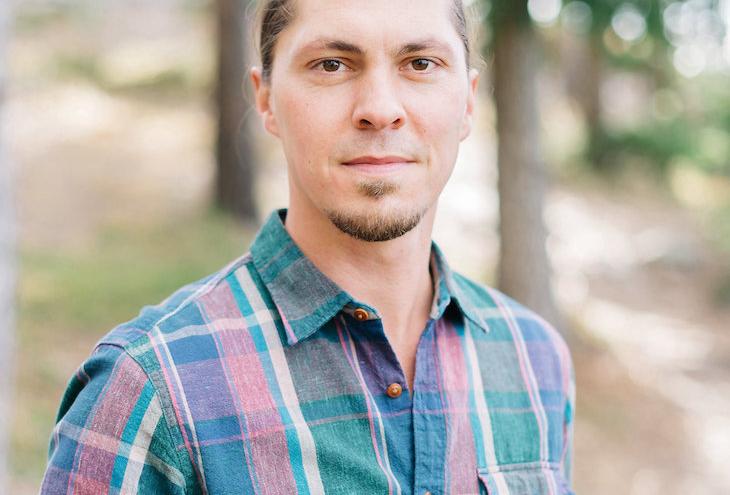He may have been raised in the city, but Dr. Clint Carroll has always felt most at home in the woods. From Texas to Arkansas, and Oklahoma to Colorado, Dr. Carroll’s love of the land developed at a young age. Now an associate professor at the University of Colorado Boulder, Dr. Carroll, Cherokee Nation, uses his knowledge of the land to address tribal environmental issues.
Growing up in metropolitan Dallas, Dr. Carroll could have become enamored with big-city life. Instead, he gravitated toward undeveloped land. “Perhaps because of my father’s rural upbringing, we got out of the city a lot to camp,” he explains. With his father’s guidance, Dr. Carroll learned to appreciate the land around him. “My dad taught me at an early age to respect the land and the other-than-human beings we share it with,” he adds.
That affinity guided his academic journey, even when he wasn’t sure where that journey would take him. “As a Native scholar representing the first generation in my family to seek an advanced degree, I didn’t have many models for what success looks like in academia,” he says. The same was not true for family loyalty though. “As a single mother to my brother and me throughout most of my childhood, my mom showed me what strength and dedication to family looked like and has always supported my goals, even if they took me farther away than she’d prefer,” he explains.
Dr. Carroll first attended the University of North Texas but dropped out after his first year, having no sense of direction. After some time away to travel and work outside the academy, he returned to school, taking courses at a local community college in Dallas. “It was there that I found my direction, and with the guidance of one of my instructors, pursued my studies in anthropology and American Indian studies,” he says.
From there, with the support of his family, he started college at the University of Arizona, where he found his passion for environmental and social science along with a supportive Native community. “The American Indian Studies Program, Native American Student Affairs, and Red Ink Magazine were invaluable for my well-being and success,” he says.
As an undergraduate, he traveled to Mexico and the Bahamas to work on environmental issues. Dr. Carroll came away from these trips knowing that he wanted to do more. “I developed a passion for understanding and addressing environmental issues through the lens of local knowledge and community-based, applied research,” he explains. “As I was preparing to graduate, I sought ways to use these experiences and skills in the service of my Cherokee community in Oklahoma.”
After graduating with a degree in anthropology, Dr. Carroll worked with the Cherokee Nation’s Environmental Programs department. Tasked with developing a tribal ethnobotany project, Dr. Carroll became even more engrossed in environmental science. By the time he made his way to the University of California, Berkeley, for graduate school in environmental science, policy, and management (ESPM), he was confident in his goals and excited about what lay ahead.
Still, post-baccalaureate study proved to be more difficult than he had anticipated. “Graduate school at Berkeley was daunting,” he recalls. “I was often intimidated and unsure of my intellectual abilities because the culture there could be competitive.” Luckily, he again found a welcoming and supportive community in the American Indian Graduate Program, the American Indian Grad Student Association, and AISES. “They are a support system of peers and faculty who understand why we do what we do and its importance to our families and communities,” he says.
As a graduate student Dr. Carroll threw himself into his work. He was a member of the ESPM Diversity Council, and helped to create the Cherokee Nation Medicine Keepers — a small group of elders who work toward the continued use and revitalization of their land-based knowledge. In 2011, he completed his PhD.
Dr. Carroll wanted to stay in higher education and spent the next four years as a post-doctoral associate and assistant professor at the University of Minnesota Twin Cities. In 2015, he joined the Department of Ethnic Studies at the University of Colorado Boulder as an assistant professor. Now an associate professor, he sees that his reach extends far beyond the university’s walls.
Working closely with the Medicine Keepers, Dr. Carroll is coordinating a land education program and overseeing a study about Cherokee plant gathering in Oklahoma. “We hope to formulate lasting methods for maintaining Cherokee land-based knowledge,” he explains, “and to better understand how Cherokee people are negotiating access to land due to complex ownership patterns and the impact of shifting climate conditions.” In 2015, he published a book about this work: Roots of Our Renewal: Ethnobotany and Cherokee Environmental Governance. He also serves as a mentor in the AISES program Lighting the Pathway to Faculty Careers for Natives in STEM.
Dr. Carroll is focused on using his knowledge to help his community. “My experiences have shaped my approach to service leadership among the Cherokee Nation,” he says. “I see this as a lifelong commitment to cultivating within myself the qualities of a community-focused Cherokee intellectual — didehlquasgi (learner and observer).” From the halls of academia to the hills of Oklahoma, Dr. Carroll is doing just that.
—Alexa Panza













